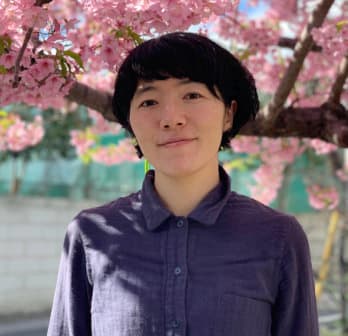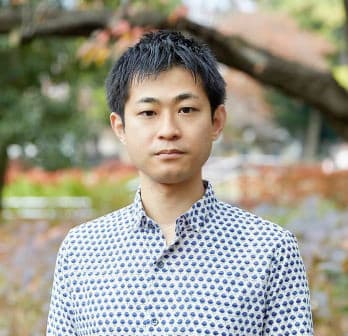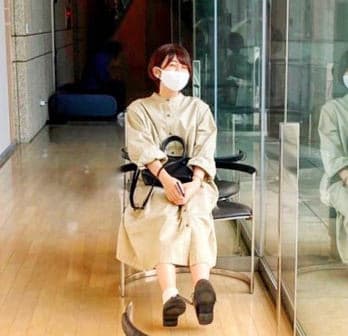When Naoki next opened them, he was plunged into confusion.
His surroundings had utterly changed. Inexplicably, he seemed to be—not in the workshop where he’d been until now, but in the carriage of a train. The craftsman, Yukako and Kazuto were nowhere to be seen; instead a crowd of strangers surrounded him.
As the carriage clacked along, swaying from side to side, Naoki thought, Is this a tram...? His guess turned to certainty as he surveyed the seats, the straps, and the view out the window. He was definitely on a tram—one of the streetcars that ran through the city of Hiroshima.
Why here, all of a sudden...?
At that moment he heard a child’s voice: “Hey, Dad, how long till we get to the ballpark?”
Naoki automatically turned toward the voice. Two young boys and a girl were standing next to him. Rocked by déjà vu as he saw their faces, he involuntarily opened his mouth and said, “We’re almost there.”
“Can’t wait to see the game,” said one of the boys, who seemed to be the oldest. He asked Naoki, “Dad, think the Carp can win today?”
Again a reply came out of Naoki’s mouth without him willing it. “It’s not a question of ‘can they win’. They’re gonna win.”
Could it be—Naoki had a hunch—that these kids are us back when we were little...? And I (my present-day self) am now my dad in the past...?
The words of the craftsman flashed into his mind. ‘Our clients’ bygone days are given concrete form as arrows. That’s what these time arrows are.’
Naoki realized: by touching the time arrow, I’m now experiencing my dad’s bygone days.
Just then the tram conductor came along to check if any passengers needed to break a note to pay the fare. They all edged over to the side to make way, and the conductor passed by.
As Naoki moved over, the surrounding scene flew into his field of vision. Around them on the tram were people wearing Hiroshima Carp baseball caps and uniforms. I get it, so our past selves must be on the way to support the Carp... When he understood that, he was gripped by nostalgia. For him the tram meant baseball, and baseball meant the tram. Whenever he and his family had gone to cheer on a game at the old Hiroshima Municipal Stadium, they’d always taken the tram.
“Dad, what time will it finish today?”
It was the girl’s voice; Naoki dropped his gaze to her in perfect sync with Tetsuo's movement. It was Yukako who had spoken. Tetsuo started to open his mouth to say something to her.
But before he could, the boy next to her, boy-Naoki, got in first. “Doesn’t finish until someone wins.”
“Awww, why can’t it hurry up and finish...” Yukako moaned.
“Why?” asked boy-Naoki.
“’Cause it’s boring.” She turned to her younger brother. “Kazuto, don’t you think it’s boring?”
The baby-faced Kazuto said to Yukako, “I like baseball, but don’t really like the ballpark ... ’Cause it’s so loud.”
Boy-Naoki snickered. “What? That’s what’s good about it. Yukako doesn’t know anything about baseball and Kazuto’s a wimp: haha, you’re both such babies.”
“Shut up!” “You’re the one who’s a baby!”
They were making a ruckus and Tetsuo had to intervene. “Stop fighting!” he thundered. They started at his loud voice and settled down.
As Naoki watched this sequence of events play out, inwardly he gave a wry smile. Then and now, the three of us haven’t changed at all.
Yet there was something that surprised him. It was to do with Tetsuo’s emotions, which came to Naoki as naturally as if flowing through him. Tetsuo’s angry shout had the power to cow his children. But behind the facade of anger Tetsuo adopted, secretly he enjoyed sharing these moments with them.
The three children regrouped; before long they were talking about anime. All the while Tetsuo’s watchful gaze never left them.
Watching the playful trio through Tetsuo’s eyes, present-day Naoki let his mind drift. The old Hiroshima Municipal Stadium had been retired; baseball games were now held at the new stadium, which was close to Hiroshima Station. This had changed the route to get to the ballpark: most people could now get there without taking the tram. But Naoki wanted to imagine that there must still be families on the trams, having interactions like these.
Soon the three kids in front of him were getting more and more heated on the subject of anime. Oblivious to Tetsuo watching over them, they escalated into another fight—
All of a sudden, just as if switching to a different channel, the scene Naoki was looking at shifted. What burst into view were people sitting at a counter, sipping on beers.
So this is someplace else...? Naoki was disoriented and it took him a moment to notice the teppan: the giant iron hot plate installed on the counter. When he saw what was sizzling on the teppan, inwardly he cried out, it’s an okonomiyaki restaurant!
The next instant Naoki found himself saying, in Tetsuo’s voice, “I’m here to pick up my order.”
“It’s almost ready, so have a seat—it won’t be long.”
When Naoki saw the face of the man at the counter who had spoken, he gasped. It was the proprietor of the Nakagawa, the okonomiyaki restaurant nearby his childhood home.
The memories came flooding back. On days when Tetsuo had to work late, he would often buy the savoury pancakes from the Nakagawa and bring it home for them. Their usual order was the plain, basic niku-tama (pork and egg): with soba noodles in the pancakes for the kids, and udon noodles in Tetsuo’s.
Just then, right in front of him another customer’s order was being prepared. Naoki watched closely through Tetsuo’s borrowed eyes.
First the proprietor spread the batter out into a circle on the hot plate, swiftly heaping cabbage and bonito flakes on top. Next he added bean sprouts, crispy bits of deep-fried tempura batter and pork to the pile, then turned it over with two spatulas to steam. After a while, he spread out some soba noodles and transferred the whole pancake on top of them with practised ease. Once it had cooked enough, he deftly moved it atop a thin layer of egg. He turned it over one more time and slathered it generously with sauce. Finally, the okonomiyaki was sprinkled with tasty dried green seaweed and served out.
It’s so long since I had Hiroshima-style okonomiyaki, Naoki thought, expecting his stomach to growl any minute.
Before too long Tetsuo’s name was called and he got his four pancakes.
Back home, his three children clustered round him.
“Smells like okonomiyaki!” Boy-Naoki cheered.
Yukako was also bouncy with glee. “Yay! But Dad, why’re you smiling like that?”
Kazuto noticed it too. “Yeah, true. Dad, you’re smiling.”
“I’m not smiling. Never mind that, let’s eat it quick before it gets cold.”
Just after they all dug in, boy-Naoki cried out, “Huh? What’s in this? Oh, yum, it’s shrimp!”
Yukako and Kazuto shouted as well. “Mmm, it’s got squid in it!” “And mochi rice cakes too—this isn’t the usual one we get!”
Boy-Naoki asked Tetsuo, “Is it the deluxe special?”
Tetsuo nodded.
“Wow! But why?!” he demanded.
“Well, I get it every once in a while,” Tetsuo said evasively.
“Oh, so that’s why you were smiling just now?” Yukako pointed out. “Dad was smiling ’cause he wasn’t telling us it was the special!”
But Tetsuo stubbornly refused to admit anything. “Told you I wasn’t smiling.”
“Hmm, well, whatever.” Yukako instantly lost interest and concentrated on munching the extra special okonomiyaki.
Meanwhile, Tetsuo’s thoughts came unbidden to Naoki. Recently boy-Naoki had been selected by a soccer club as a regular player. Yukako had won a prize in a calligraphy contest and Kazuto had learned to do a back hip circle on the bar. Happy to see his children’s progress, he’d wanted to have a small celebration. But he ate in silence, not letting any of these feelings show.
“Mine’s all gone, it wasn’t enough! Hey, gimme some of yours.” With one swift move, boy-Naoki swiped the best bits from Yukako and Kazuto.
They protested. “My squid!” “My mochi!”
“Ha, ha, so yum!” boy-Naoki taunted them.
Tetsuo was tired of their squabbles. Before the usual fight could break out, he took squid and mochi from his own pancake and transferred them to Yukako and Kazuto’s plates. “Pipe down and eat that.”
When boy-Naoki saw that, he protested. “Hey, not fair!”
“Don’t give me that,” Tetsuo told him. “You helped yourself to Yukako’s and Kazuto’s, didn’t you?”
Boy-Naoki was now pouting; Yukako and Kazuto stuck their tongues out at him and said “Nyah, nyah”—
Abruptly the scene changed again. This time Tetsuo was in a different room somewhere.
Naoki soon figured out where he was. He could tell because there were piles of shamoji all around—wooden rice scoops with calligraphy in black ink on them. These were lucky souvenirs sold on the island of Miyajima, the birthplace of the biwa lute-shaped shamoji.
Definitely, Naoki thought, this has got to be my grandparents’ place on Miyajima.
Naoki’s grandparents had run a small souvenir shop from their home, writing wishes for good fortune on rice scoops and selling them. So when Naoki and his siblings visited, they would often help out by wrapping the goods or standing at the till.
However, Naoki could tell that it was now after 9 pm and his grandparents had shut up shop for the day. The three children were there with him, relaxing. At this time of night, they should be getting ready for bed, but it looked as if they hadn’t even taken their baths yet.
Then Tetsuo said, “We should get going.”
“Yeah!” the children shouted gleefully and followed him outside.
The dark streets were filled with people holding lanterns, all walking in the same direction. When he saw them, Naoki understood what was going on. It’s the Kangen-sai! A surge of excitement flooded through him.
One of the three great boat festivals of Japan, the Kangen-sai Festival is a Shinto ritual of the sea, held on the 17th day of the sixth month according to the old lunar calendar. On the late afternoon of that day, the goza-bune—a large boat made up of three traditional wooden boats bound together, which carries the goddesses of the shrine—leaves the Itsukushima shrine on the island of Miyajima and heads for the opposite shore to visit the Jigozen shrine. After the rituals are performed there, the goza-bune returns to Miyajima to be greeted by people holding paper lanterns. The goza-bune performs the rituals at the Nagahama and Ōmoto shrines, one after the other, and finally takes the shrine goddesses back to the Itsukushima shrine.
To witness the grand finale, the people who greeted the boats at Nagahama walk to Itsukushima with their lanterns in their hands. These were the people walking past them now; this was a lantern parade.
But in the middle of the fantastic, dreamlike spectacle, Yukako raised her voice to complain. “This is the worst! Wish I had a lantern.”
Boy-Naoki agreed. “Yeah, me too. If Kazuto hadn’t whinged about his sore tummy, we could’ve gotten lanterns.”
Kazuto looked like he was about to burst into tears.
“What’s done is done,” Tetsuo rebuked them. “Stop going on about it!” He turned to Kazuto. “You too. It’s not worth crying over!” he told him.
With sulky faces, the three of them joined the lantern parade.
Eventually they arrived at the Itsukushima shrine complex. Under the full moon the lit-up vermilion pavilions floated rosily in the darkness.
The four of them found a spot in one of the open air corridors to watch the goza-bune returning. The sea had risen high enough to stretch out a hand and touch; it gave off a powerful scent of brine. The lantern lights that lined the eaves were reflected on the surface of the water, wavering gracefully.
After some time had passed, Tetsuo cried out, “Here they come!”
The goza-bune, which had come into view, was making its way through the giant vermilion torii gate which towered over the sea. The crowd greeted the boat carrying the goddesses with loud applause and cheers.
It wasn’t long before the goza-bune completed the ceremony and finally made its way into the inner square of sea (the Masugata) enclosed by the shrine. As the ancient court music rang out over the water, the men on the boat worked together to row with all their strength. The air was charged with a feverish tension. Bombarded by camera flashes, the boat revolved three times, almost grazing the shrine buildings.
Once the rituals were concluded, the deities were returned to the main shrine to clapping and cheering. The three children stood there, filled with wonder at the spectacular sight. Naoki was just as bemused and awed.
However, Tetsuo’s focus was different. While he too was stirred by the atmosphere, he alone of the family offered up silent, fervent prayers. May my family always be healthy and well.
Naoki was acutely aware of Tetsuo’s prayers welling up.
May my children grow into fine adults. Tetsuo kept praying to the goddesses who were returning to the main shrine...





